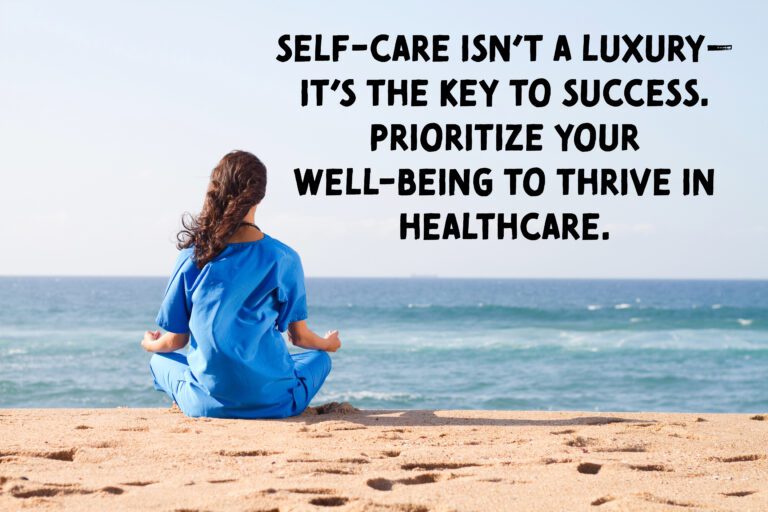Ideal Reader:
International-trained nurses experiencing the emotional and psychological challenges of transitioning to life and work in the U.S.
Target:
Nurses facing stress, burnout, or homesickness need practical strategies for maintaining mental health and well-being in a high-stress environment.
Introduction:
- What You Will Learn: This article provides actionable strategies for maintaining mental health while adjusting to life and work in the U.S., including stress management, burnout prevention, and emotional resilience techniques.
- Problems It Solves: Helps nurses deal with the emotional challenges of adapting to a new environment and a demanding job, offering practical solutions for staying mentally healthy and avoiding burnout.
Key Questions Answered:
- How can I manage stress and prevent burnout?
- What mental health strategies can help me adjust emotionally to life in the U.S.?
- How can I build resilience to succeed in a high-stress healthcare environment?
Shifting Focus from Surviving to Thriving
Challenging Assumptions:
Many international nurses feel that burnout and stress are inevitable in high-stress healthcare roles, especially when adjusting to a new country and healthcare system. However, these challenges can be managed through proactive mental health strategies (National Academy of Medicine, 2020). Mental health is not just a personal issue but a critical factor in professional success and longevity. Addressing stress and burnout early can prevent long-term emotional and professional exhaustion.
Reframing the Idea:
Mental health and well-being are critical to career success. Managing stress, balancing work-life responsibilities, and building emotional resilience are essential for thriving in a nursing career in the U.S. (American Nurses Association [ANA], 2020).
Maintaining Your Mental Health in the U.S.
1. Understanding and Managing Burnout:
Burnout is a serious issue in the nursing profession, characterized by emotional exhaustion, depersonalization, and a sense of reduced personal accomplishment. Burnout can affect your mental health, job performance, and well-being (National Academy of Medicine, 2020). International nurses may face additional stressors, such as adapting to a new work environment and dealing with cultural differences, which can exacerbate burnout. Recognizing the early signs of burnout and taking proactive steps—such as seeking support or taking breaks—is essential.
Read more about preventing burnout here.
2. Work-Life Balance:
Nurses often face long shifts, demanding workloads, and high-pressure environments. Balancing these work demands with personal responsibilities is key to preventing burnout. Establish clear boundaries between work and personal life, and make time for activities that promote relaxation and well-being, such as exercise, hobbies, or spending time with loved ones (American Psychological Association [APA], 2020).
Learn more about work-life balance tips here.
3. Building Emotional Resilience:
Emotional resilience refers to the ability to bounce back from stressful situations and adapt to change. Nurses can build resilience by developing coping mechanisms, practicing mindfulness, and seeking support from peers and mentors (Shatté et al., 2019). Mindfulness meditation, journaling, or regular physical activity can improve emotional resilience and help manage stress.
Discover resilience-building techniques here.
4. Seeking Professional Help When Needed:
There’s no shame in seeking help from mental health professionals. Counseling or therapy can provide you with strategies to manage stress and emotional challenges, especially during major life transitions like moving to a new country. Many healthcare organizations also offer Employee Assistance Programs (EAPs) that provide free and confidential mental health support (APA, 2020).
Explore mental health resources for nurses here.
5. Connecting with a Support Network:
Building a strong support network is essential for emotional well-being. Surround yourself with friends, family, or colleagues who understand your challenges and can offer encouragement and guidance. Participating in professional organizations, online support groups, or cultural communities can provide the emotional connection needed to feel grounded (National Academy of Medicine, 2020).
Learn more about building a support network here.
Start Prioritizing Your Mental Health
Mental Health Self-Assessment:
Use a self-assessment tool to evaluate your current mental health. Are you feeling overwhelmed, anxious, or disconnected? Identifying early signs of burnout or emotional exhaustion can help you take action before your mental health suffers further.
Steps to Build Mental Resilience:
- Practice Mindfulness: Set aside 10 minutes daily for mindfulness exercises, such as meditation or deep breathing, to help manage stress and prevent burnout (Shatté et al., 2019).
- Set Work-Life Boundaries: Limit after-hours work communication and create personal rituals that separate your work and home life (APA, 2020).
- Engage in Physical Activity: Exercise is a proven way to reduce stress and improve mental health. Aim for at least 30 minutes of moderate activity most days of the week (ANA, 2020).
- Seek Support: Reach out to friends, family, or a professional counselor to discuss challenges and gain perspective (National Academy of Medicine, 2020).
Overcoming Mental Health Stigmas
Common Objections:
- “I do not have time for self-care.”
- “Seeking help feels like admitting weakness.”
Response:
Caring for your mental health is just as important as caring for your physical health, especially in a demanding profession like nursing. Taking small steps—like practicing mindfulness or talking to a mentor—can greatly impact your overall well-being. Seeking help is a sign of strength and self-awareness, not weakness (APA, 2020).
Next Steps: Begin Your Mental Health Journey
Take Action Today:
Start by integrating one self-care practice into your daily routine—mindfulness, physical activity, or journaling. Small, consistent actions will help you build emotional resilience over time.
Build Your Support Network:
Contact a trusted colleague, friend, or mentor to discuss your experiences and challenges. Having someone to talk to can reduce feelings of isolation and help you process your emotions more effectively.
Visualizing Emotional Well-Being
Imagine a future where you feel emotionally resilient, balanced, and supported personally and professionally. You will perform better at work and lead a more fulfilling life by prioritizing your mental health. Mental health is key to your success—both in your career and beyond. Take the steps today to safeguard your well-being and build a brighter, healthier future.
References:
- American Nurses Association. (2020). Stress management and mental health in nursing. https://www.nursingworld.org/practice-policy/work-environment/mental-health/
- American Psychological Association. (2020). The importance of work-life balance. https://www.apa.org/news/press/releases/stress/2020/work-life-balance
- National Academy of Medicine. (2020). Taking action against clinician burnout: A systems approach to professional well-being. https://nam.edu/initiatives/clinician-resilience/
Shatté, A., Perlman, A., Smith, B., & Lynch, W. D. (2019). The positive effect of resilience on stress and business outcomes in difficult work environments. Journal of Occupational and Environmental Medicine, 61(2), 147-153. https://doi.org/10.1097/JOM.0000000000001501
Additional Resources :
- Employee Assistance Programs (U.S. Department of Labor)
- Mental Health Resources for Healthcare Workers (National Institute of Mental Health)
- Managing Work-Related Stress (Mayo Clinic)
- National Suicide Prevention Lifeline (Suicide Prevention Lifeline)
- Coping with Homesickness and Cultural Adjustment (CDC)


